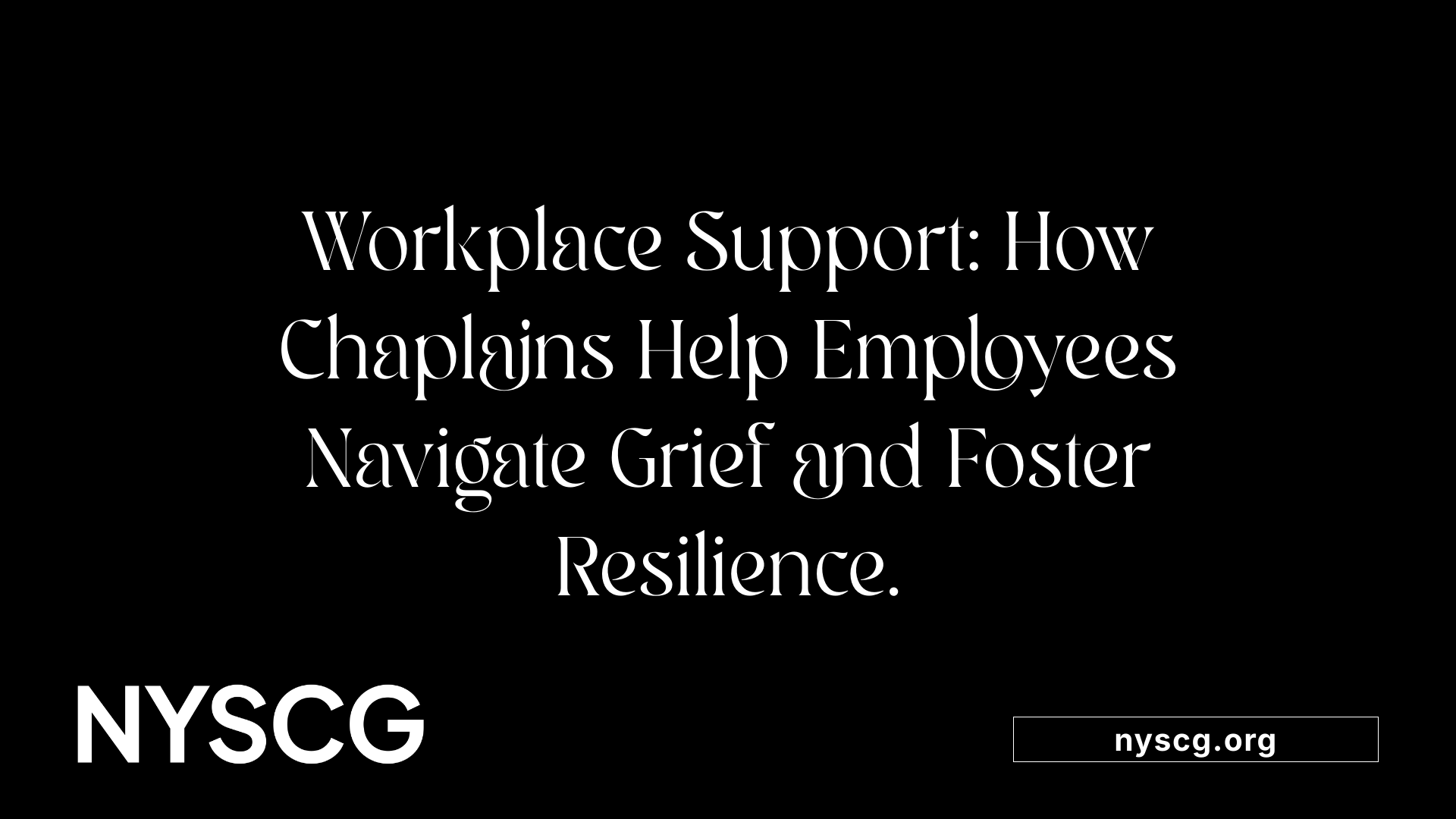Struggling With Grief? How a Chaplain Can Help You Heal


When faced with the profound experience of grief, many individuals find solace in the compassionate presence and expert guidance of chaplains. These trained spiritual caregivers offer a holistic approach to coping with loss, addressing emotional, spiritual, and practical needs. This article explores how chaplains serve as vital allies in healing from grief, their strategies for supporting individuals during end-of-life scenarios, and how their services extend into workplaces and communities, helping people find peace and resilience.

Chaplains play a vital role in providing comprehensive care to those experiencing grief and loss. They offer emotional guidance by creating a safe space for expressing feelings such as guilt, fear, anger, and remorse. Through compassionate listening and counseling, chaplains help individuals explore their emotions and find pathways to healing.
Spiritual support is core to their work. They help patients and families connect with their faith, offer prayer, facilitate religious rituals like anointing and reconciliation, and assist in making peace with death and the afterlife. These rituals aid in achieving a sense of completion and acceptance.
In addition to emotional and spiritual assistance, chaplains support the processing of feelings through meaningful activities. They encourage rituals like nature walks, journaling, or talking to loved ones who have passed away, which can be therapeutic. They also assist in life review, helping individuals reflect on their life stories and relationships.
Furthermore, chaplains coordinate with community resources to provide ongoing bereavement support. They organize support groups, facilitate memorial services, and offer grief counseling, which is crucial as grieving can be a prolonged process. They also advocate for normalizing open conversations about death in society, helping reduce the taboo surrounding grief and mourning.
In workplace and community settings, chaplains extend these services, offering emotional support during difficult times. They help employees and community members navigate the complex emotions associated with loss, promoting resilience and emotional well-being.
Ultimately, chaplains serve as non-judgmental, calming presence, guiding individuals and families toward peace, acceptance, and healing during some of life's hardest moments.

Chaplains are essential in delivering compassionate emotional and spiritual support for patients facing the end of life and their families. They begin by conducting thorough spiritual assessments to understand individual needs and preferences, ensuring their approach respects diverse religious and cultural backgrounds.
During this delicate time, chaplains facilitate open conversations about fears, hopes, and unresolved issues related to death. They offer a calming presence through prayer, reflective listening, and emotional reassurance, helping individuals find peace and meaning despite difficult circumstances.
Chaplains also support families in making important decisions about care, such as discussing goals of treatment or choosing rituals that align with their beliefs. They assist in creating rituals and moments of closure, such as religious sacraments like anointing or reconciliation, which can bring comfort and acceptance.
Beyond the dying process, chaplains provide ongoing bereavement support to families and caregivers, helping them process grief, address feelings of guilt or remorse, and find a path toward healing. Their presence can help alleviate feelings of loneliness, guilt, or anger, providing a safe space for honest emotional expression.
Overall, chaplains help foster a sense of peace, dignity, and spiritual well-being. Their work is rooted in respect for each individual's unique journey, offering support that affirms personal faith, beliefs, or personal understanding of life and death.
In their practice, chaplains are trained to support individuals from all faith backgrounds—or none at all—without imposing any particular belief system. Their goal is to facilitate a space where personal spiritual needs can be expressed freely.
They may connect patients with faith leaders from various religious traditions or help incorporate religious rituals and practices that are meaningful to the individual. If someone prefers non-religious or secular approaches, chaplains can offer mindfulness, reflection, or other supportive activities aligned with personal values.
This inclusive approach ensures that each person’s spiritual journey is honored, fostering trust and comfort during vulnerable moments.
Chaplains help patients and families navigate complex emotions like fear, anger, guilt, or regret. By fostering honest dialogue and providing a non-judgmental space, they enable individuals to come to terms with their situation.
They support the practice of life review, allowing patients to reflect on their life stories, express forgiveness or love, and find gratitude. These practices can facilitate acceptance and prepare both patients and families for a peaceful transition.
Guided by personal beliefs or faith-based principles, chaplains help individuals reconcile feelings of unfinished business, reconcile relationships, and develop a sense of spiritual closure.
Chaplains assist in planning and conducting meaningful rituals that provide comfort and closure. These may include prayer, religious ceremonies, or personalized acts that honor the patient's life and wishes.
They also help families prepare for significant decisions, such as choosing hospice, determining appropriate medical interventions, or deciding how to say goodbye. Through discussions and spiritual guidance, chaplains aim to align care with the patient’s values and beliefs.
In doing so, they help ease the emotional burden on families, encouraging acceptance and fostering peace during difficult transitions.
Table of End-of-Life Support Aspects with Descriptions
| Aspect | Description | Example Activities |
|---|---|---|
| Spiritual and emotional assessments | Understanding individual or cultural needs for personalized care | Interviews, questionnaires, spiritual history |
| Respect for diverse beliefs | Supporting various faiths or secular preferences | Connecting with faith leaders, inclusive rituals |
| Creating peace and acceptance | Helping process feelings and find closure | Life review, expression of forgiveness |
| Facilitating rituals and decisions | Supporting meaningful ceremonies and care choices | Prayer, religious sacraments, life celebration |
This comprehensive approach underscores the importance of holistic, respectful, and personalized care during end-of-life experiences, ensuring dignity, comfort, and meaningful connection for patients and their loved ones.
Chaplains employ a variety of approaches aimed at providing comfort and fostering healing during times of loss. One of the primary methods is conducting spiritual assessments, which help them understand each individual's beliefs, values, and personal preferences. This understanding allows for tailored spiritual support that resonates with the person's faith or spiritual outlook.
Providing personalized support often involves activities such as prayer, scripture reading, and music. Chaplains are present as compassionate listeners, offering a calming and nonjudgmental presence to patients and families. This active listening helps individuals express their feelings and navigate complex emotions like guilt, fear, or anger.
Rituals and memorials play a significant role in helping those affected by grief. Chaplains facilitate religious and non-religious ceremonies, memorial services, and personal rituals like journaling or nature walks. These activities serve as meaningful outlets for processing grief, reframing experiences, and discovering purpose.
Supporting open conversations about end-of-life wishes, advance care planning, and connecting with faith communities further encourages spiritual continuity and peace. Such discussions can diminish fears and provide clarity during challenging times.
To enhance overall healing, chaplains also organize support groups, mindfulness sessions, and stress management initiatives. They work to educate staff and train them to recognize signs of grief, fostering a caring environment that promotes emotional resilience.
In sum, chaplains use their understanding of individual spirituality, combined with supportive rituals and community connections, to help people find hope, acceptance, and ultimately, peace amidst grief.
Spiritual care and chaplain services provide profound support during times of loss and approaching death. They offer comfort and reassurance by helping individuals find a sense of peace amid the emotional turmoil of grief. Chaplains help address spiritual distress and support existential questions, which is vital for many facing their own mortality or that of a loved one.
These services assist in personal meaning-making, allowing patients and families to process difficult feelings such as guilt, remorse, fear, or anger. Engaging in rituals like prayer, reconciliation, or memorial activities can foster emotional healing and closure. Moreover, chaplains help culturally diverse individuals by respecting and incorporating their beliefs and practices, ensuring a personalized approach.
Spiritual care also enhances decision-making by clarifying values and wishes, especially around end-of-life choices such as hospice care, Do Not Resuscitate orders, or funeral planning. This holistic support benefits both patients and caregivers, strengthening resilience and helping them navigate the grieving process.
Ultimately, integrating spiritual support into healthcare emphasizes a compassionate, respectful approach that promotes emotional well-being, spiritual peace, and a sense of connectedness during some of life’s most challenging moments.

Chaplains play a crucial role in healthcare environments such as hospitals and hospices by offering holistic support that addresses emotional, spiritual, and mental well-being. During times of illness, loss, or impending death, they provide a compassionate presence that helps patients and families navigate complex feelings like fear, grief, guilt, and hope.
One of their fundamental contributions is creating a safe space where individuals can openly express their deepest emotions and spiritual concerns. They assist in exploring unresolved relationships, seeking forgiveness, and finding meaning in life's final stages. Respecting diverse religious and cultural backgrounds, chaplains facilitate inclusive rituals, prayer, and spiritual practices that align with personal beliefs.
Chaplains work closely with medical teams to enhance overall care quality. Their support can improve patient satisfaction, aid in ethical decision-making, and help reduce feelings of isolation or despair. For families, especially those experiencing anticipatory grief, chaplains guide them through the mourning process, encouraging reflection and emotional expression.
Beyond individual care, chaplains also contribute to the emotional resilience of healthcare staff by providing support and helping them cope with the emotional toll of their work. Their presence helps foster a compassionate environment where comprehensive care, inclusive support, and emotional healing are prioritized.
In summary, chaplaincy enriches healthcare by addressing the often-overlooked spiritual and emotional needs of patients and families, ultimately promoting peace, hope, and healing during life's most difficult moments.

Workplace chaplaincy plays a vital role in supporting employees through the often difficult process of grief. Chaplains offer confidential emotional and spiritual support, creating a safe space where employees can openly share their feelings, trauma, or worries without judgment.
They help individuals navigate complex emotions such as guilt, fear, anger, and sadness. By providing personalized guidance, chaplains facilitate resilience and healing, helping employees to process their grief in healthy ways. This includes offering rituals like memorial services or remembrance workshops that honor loved ones and foster a sense of community.
Chaplains also support employees by encouraging open communication between staff and management. They help cultivate a workplace culture based on compassion, trust, and understanding, which can improve overall morale and cohesion.
In addition, workplace chaplains often assist with practical matters like connecting employees with counseling resources or facilitating difficult conversations about loss and recovery. Their presence demonstrates an organization’s commitment to employee well-being.
Ultimately, chaplaincy services boost emotional health, support long-term recovery from grief, and contribute to a more compassionate organizational environment.
| Benefit | Description | Additional Support Provided |
|---|---|---|
| Confidential Support | Safe space for emotional expression | Counseling and personal guidance |
| Rituals and Memorials | Facilitating remembrance activities | Community building opportunities |
| Improved Communication | Fosters trust and openness | Better engagement between staff and leadership |
| Organizational Care | Demonstrates commitment to well-being | Enhanced morale and resilience |
These services underscore how integral spiritual and emotional support are to workplace health, especially during times of loss.
The journey through grief is deeply personal, but with the compassionate guidance of chaplains, individuals and families can find pathways to healing, hope, and spiritual peace. Whether in hospitals, hospices, workplaces, or community settings, chaplains provide a bridge to resilience, helping to process complex emotions, perform meaningful rituals, and foster connection to faith and loved ones. Recognizing the importance of spiritual care in the grieving process underscores its vital role in holistic well-being, ensuring that no one faces loss alone. As communities and organizations embrace these supportive services, they affirm a commitment to compassionate, inclusive healing that respects each person’s unique spiritual journey.
All you need is the will to make the world a better place.
New York State chaplain group inc. is a tax deductible organization with a federal tax Id number 92-383-4921